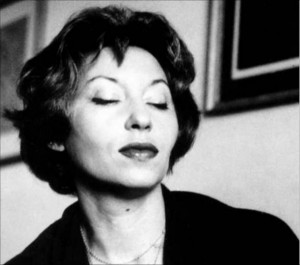You have no items in your cart. Want to get some nice things?
Go shopping
I started as a research assistant at the Instituto Moreira Salles back in June. I’d been thinking about it ever since they told me it was there, hidden away in some white box in the innards of the archive. Now my research was done, and today was my last day at the university. I could count my days left here on a blind butcher’s fingers.
So I finally mustered up the courage to ask them to let me see it. The manuscript of A Hora da Estrela. Clarice Lispector’s masterpiece, the book she wrote as she was dying, the novella that I read in my freshman year. I’d dog-eared all the pages, whispered lines to myself, ambushed friends with copies just to make them read the preface – Just read the preface and then you’ll have to read all of it.
This time they got out the white cloth gloves. I waited nervously in the research room, drumming my fingers on the table and making whispered small talk with a fellow researcher. Forms were signed, the white box was opened, envelopes were shuffled around. And there it was.
I guess I was expecting the whole novel to be sitting there in one piece. It was less like A Hora da Estrela and more like the shrapnel of A Hora da Estrela. A good third of the notes were scribbled on the backs of envelopes, scrap paper, even a few bank checks (evidently unused). Stunning phrases from the novel were scratched in a hasty hand next to phone numbers, addresses, and names.
Barata Ribeiro 208. (Maca no espelho): Olhou-se e levemente pensou: tão jovem e já com ferrugem.
The sense that I got was of a violent, uncontrolled inspiration, almost a sort of possession. There are sheets and notebooks of clear, neat handwriting in blue ballpoint, and then there are loose sheets covered in slanting crazed script, almost unintelligible, almost deformed letters that look as though they were written very fast or in the dark. I wondered if someone had been taking dictation for her. After all, Clarice suffered a terrible burn on her right hand in 1966.
But then I came across a notebook with huge passages from the novel copied out in that neat blue ballpoint. At first the sentences marched steadily across the page; but as Macabea’s death grew closer and closer, the handwriting grew larger and more erratic and started skidding off the lines, full of crossings-out and big strange asterisks. It was as if Clarice was taking notes as she watched her protagonist die, pen racing across the page, details coming too fast to take them all down.
One separated page had the opening passage written on it, the one that always hits me right in the solar plexus.
A verdade é sempre um contato interior e inexplicável. A minha vida a mais verdadeira é irreconhecível, extremamente interior e não tem uma só palavra que a signifique. Meu coração se esvaziou de todo desejo e reduz-se ao próprio último ou primeiro pulsar.
The passage starts out in clear blue ballpoint. Then the pen dies midway through the first sentence. Clarice switches to a black pen, which also stops working. The last sentence is scrawled in bright purple marker. It’s stunning.
My heart has emptied itself of all desire and reduced itself to its own first, or last, beat.
Then, envelope 10, fragment 49. It took my breath away. I can’t tell you which line it was from the book. Another torn scrap of paper, a bit larger than your hand. I was turning the pages slowly, reverently, and then I just let this one fall back on the table.
There was a perfectly outlined lipstick blot on the back of the scrap, and this sounds like the most unsettling thing in the world to say, but I recognized her mouth. It couldn’t have been anyone else. It was as if she’d wandered into the archives and done it just then, casting around for a tissue and settling for a priceless manuscript. The lips were slightly puckered in a delicate moue, the color a sort of radiant reddish pink. The kiss had left a ring of brown spots on the paper, and a shadow of it was visible on fragment 50, the next page in the envelope. It riveted me, and I didn’t dare touch it. (Don’t worry, IMS.)
The poet Armando Freitas Filho told me once about how, when he was a young man, he had been invited to Clarice’s house for coffee. He said she was gorgeous and imposing, that she had a sort of cold, unearthly beauty.
I left the research room with my head spinning, a thirty-year-old kiss burned onto the insides of my eyelids.
Flora's Rio diary was hosted by the Rio-based culture magazine Piauí, who has kindly allowed us to republish a selection of her posts here on Litro.




